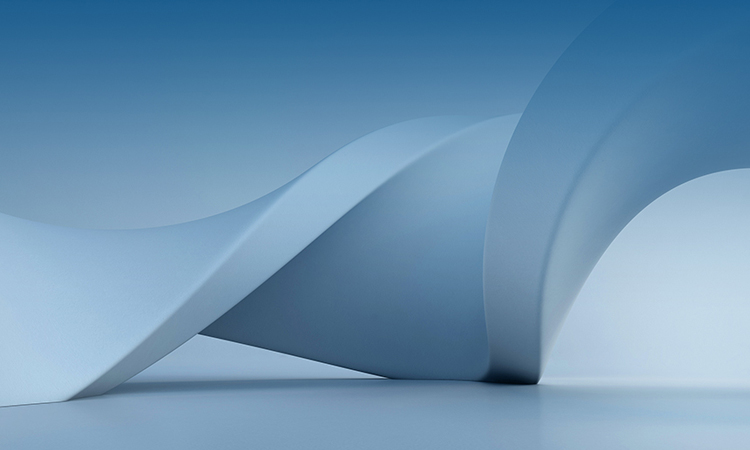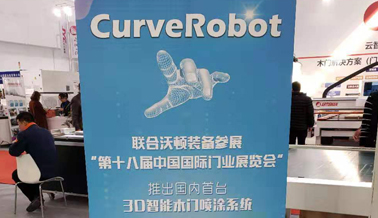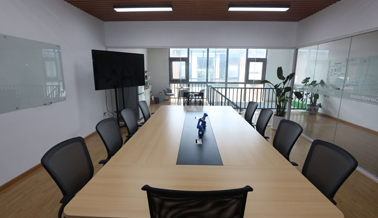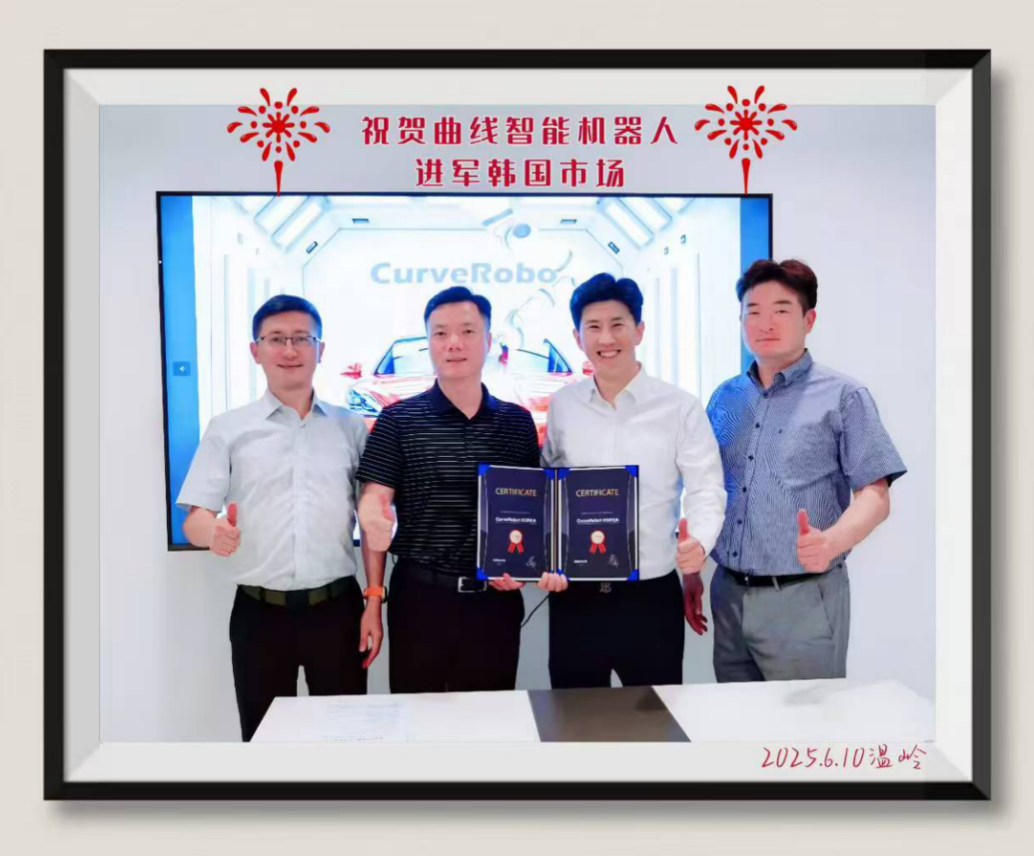

Time:2020-08-21
Curve Intelligence was founded in 2018 and received angel round investment from Yuanwang Capital at the beginning of its establishment. The company's main business is to provide intelligent robot spraying solutions based on 3D vision for small and medium-sized workpieces such as furniture, doors and windows, sheet metal, and building materials. At present, the company has provided services to industry benchmark customers such as TATA wooden doors, OPPEIN Group, and Federal Furniture.
In the home production industry, spraying work has always faced the problem of low standardization and automation of workpieces, and still relies on manual spraying. But there are pollutants in the spraying work environment, which can harm the health of workers. In addition, manual spraying is labor-intensive and difficult to ensure consistent spraying quality, resulting in a decrease in yield rate.
In recent years, with the gradual increase in labor costs and the improvement of factory automation level, robot products for spraying have also emerged. The market share of spraying robots in the spraying equipment market has been increasing year by year, from 6.33% in 2014 to 10% in 2018. However, most spraying robots require professional technicians to operate teaching devices and combine them with fixtures to operate, and cannot intelligently recognize workpieces. They cannot plan spraying paths based on the position and posture of workpieces, have low intelligence, and are difficult to adapt to the requirements of flexible home decoration spraying.
In response to these pain points, Curve Intelligence has independently developed a 3D imaging system, robot body, intelligent control algorithm, and robot operation software. In terms of workflow, the work of curve intelligent products can be roughly divided into two steps. Firstly, 3D laser scanning equipment is used to project 3D structured light and obtain the three-dimensional point cloud information of the workpiece; Then, based on the data from the point cloud map, the robot uses its self-developed intelligent AI algorithm to determine the size and spraying range of different workpieces, in order to perform spraying operations.
It is worth noting that Curve Intelligence has independently developed a six axis robot body. Previously, the Chinese spray painting robot body market was basically monopolized by foreign companies such as ABB, Duer, Fanuc, Yaskawa, Kawasaki, etc.
Our self-developed robot body adopts special waterproof, explosion-proof design and wear-resistant materials, and wraps the cable inside the body to ensure the safety of the robot to the greatest extent. In addition, the robot body adopts a design with an ultra long arm span and adds flexible accessories that can rotate 360 degrees at the last joint (wrist), which can better perform curved and corner spraying and solve the problem of missed spraying, "said Qian Xin, CEO of Curve Intelligence, to 36Kr. At present, an intelligent spraying robot can replace 2-3 spraying workers, and customers can recover costs within 2 years.
In terms of spray quality, it is reported that the curve intelligent robot can spray paint with a thickness uniformity of up to 175um, with an error of plus or minus 10um (about plus or minus 25um for spray technicians with more than 5 years of experience). In addition, through the self-developed robot body and 3D laser scanning hardware, the cost of the curve intelligent spraying robot has been significantly reduced, making it competitive in both performance and price.
Spraying robots not only replace manual spraying operations and improve the yield of sprayed products, but also enhance the digitalization level of the entire processing factory. The curve intelligent robot adopts an industrial interconnection interface, which can collect various types of data of the robot in real time, and perform real-time monitoring, remote operation, and remote diagnosis of the robot.
In terms of business model, Curve Intelligence mainly adopts direct sales and channel sales, with the main revenue coming from the sales of overall system solutions.
Speaking of the future, Qian Xin believes that the increasingly strict environmental requirements for spraying will further expand the market for spraying robots. At present, electrostatic spraying technology and UV paint process are the two main directions for reducing VOC (volatile organic compounds) emissions. Compared to traditional manual spraying methods, robot spraying is more suitable for these two advanced process directions. Firstly, electrostatic spraying requires the use of high-voltage electrostatic fields, and spraying robots can avoid human injury from high-voltage electricity. Secondly, the use of UV paint requires mechanized equipment. 3D vision intelligent spraying robots can broaden the application range of UV light cured paint, making it suitable for more complex scenes.
In addition to intelligent spraying robots, Future Curve Intelligence also plans to develop robot products for welding and polishing.
In terms of teams, Curve Intelligence currently has a team of more than 30 people. The core members of the team are from Tsinghua University, Renmin University of China, Peking University and other well-known universities. Qian Xin, the founder, once served as the director of the Anchuan Motor Application Technology Center, engaged in robot application development. He has accumulated 14 years of experience in the robot industry from technology to the market, and has led dozens of practical application projects in the fields of robot handling, welding, polishing, spraying, etc.

第十八届中国国际门业展览会
(2019-03-18)金秋时节曲线智能携手沃顿参加第十八届中国国际门业展览会。中国国际门业展览会被誉为“引领行业发展的风向标和助推器”,致力为定制家居和门业业内人士提供一个商务洽谈、新品赏鉴、观念碰撞、交流学习的最佳平台。此次参展曲线智能推出国内首台3D智能木门喷涂系统,为助力AI发展之路再增添新的血液。曲线智能只为AI智能的发展再铸辉煌。
2019-03-18

曲线智能 喜迁新居
(2019-01-02)新年伊始,曲线智能迎来了乔迁之喜。公司总部搬迁到了位于朝阳区朝阳北路尚屹文创园内。新园区环境优美、交通便利。西侧毗邻亮马厂公园和朝阳大悦城,东侧则是东五环白家楼桥。崭新的面貌迎接崭新的一年,祝愿公司在全体曲线人的团结拼搏下,取得更高的进步。
2019-01-02

Curve Intelligence Technology has reached a strategic cooperation with South Korea's LXJ Group, marking the debut of China's smart body and paint robots in the Korean market
Today, Cloud Curve (Taizhou) Robot Co., Ltd. (hereinafter referred to as "Curve Robot"), a global leader in intelligent sheet metal spraying technology, officially signed an agency agreement
2025-06-10